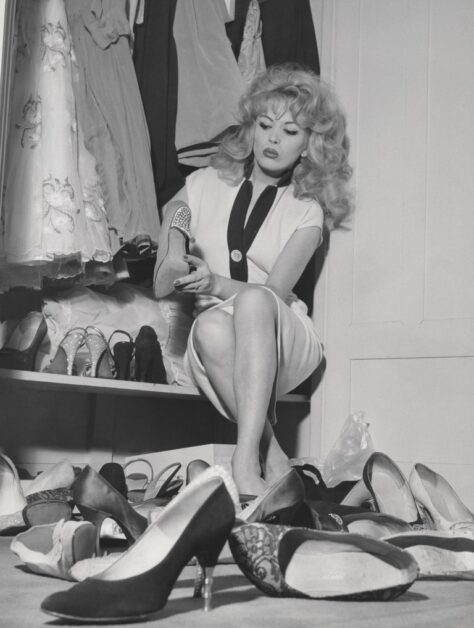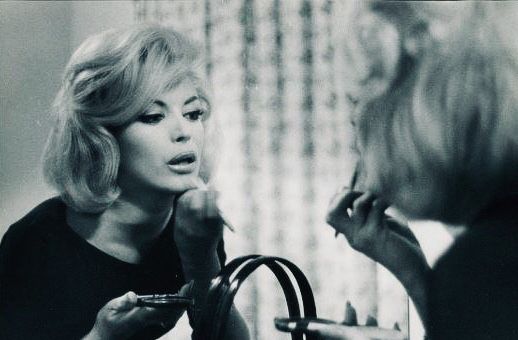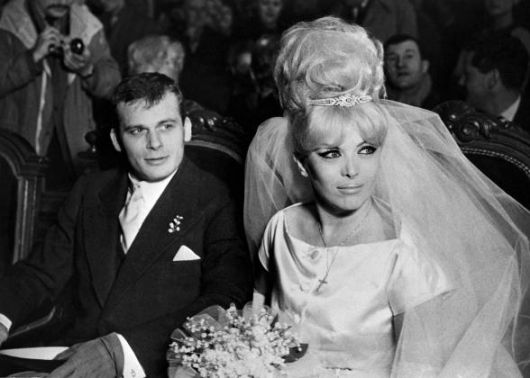Coccinelle: First French Trans Female Star
By Siobhan Donegan
It was through my admitted admiration of British iconic transgender woman April Ashley that I first learnt about the equally amazing Coccinelle. She was born in Paris France, August 23rd 1931, and as the title of this article implies she became famous for having been France’s first trans celebrity. The name that they were given by their parents was Jacques Charles, but she cleverly, in my opinion, feminised her first two names to Jacqueline Charlotte. She later stated, “As a boy aged four I knew I was different. I was a girl, really, but nobody could see it”. Jacqueline ‘earned’ the nickname -which she subsequently adopted as a stage name- ‘Coccinelle’ (Ladybug or Labybird) after appearing at a party in a red dress with black polka dots.
 Coccinelle was born in Paris at 66 Rue Notre Dame de Nazareth in the 3rd ‘arrondissement’ of Paris, and was brought up in the Temple district. She was lucky enough to have a ‘relatively supportive family’ and apparently from a young age, expressed her inner femininity by wearing dresses and wigs. The Temple area of Paris is ironically near to what is now a thriving gay nightlife scene, the Marais. Coccinelle did not come from a particularly wealthy family and the first job she ever had was in a hairdressing saloon. Unfortunately her father’s homophobia made him fear that his ‘son’, through this form of employment, would become a homosexual.
Coccinelle was born in Paris at 66 Rue Notre Dame de Nazareth in the 3rd ‘arrondissement’ of Paris, and was brought up in the Temple district. She was lucky enough to have a ‘relatively supportive family’ and apparently from a young age, expressed her inner femininity by wearing dresses and wigs. The Temple area of Paris is ironically near to what is now a thriving gay nightlife scene, the Marais. Coccinelle did not come from a particularly wealthy family and the first job she ever had was in a hairdressing saloon. Unfortunately her father’s homophobia made him fear that his ‘son’, through this form of employment, would become a homosexual.
Coccinelle eventually entered the ‘vibrant cabaret’ world as a Drag Queen or ‘female impersonator’ according to the public comprehension of the time -some performers did even self-identify as transvestites. Another general term that was used for these glamorous individuals was ‘transformistes’. However, Coccinelle’s self-awareness and comprehension obviously extended ‘beyond their stage personae’ as she clearly felt a strong ‘affinity’ with her ‘femaleness’.
This stunningly beautiful woman had a sense not only for elegant fashion -she became renowned for her trade mark polka dot dresses and mink coats -but she also discovered that she had a talent for the performance arts. After making her debut at Chez Madame Arthur (Paris in 1953) which was a fashionable cabaret, Coccinelle advanced onto the popular music hall at Le Carrousel de Paris which had opened in 1947. In fact, Coccinelle was a very talented singer upon which she built a career. She also developed her style by taking inspiration from and modelling her ‘look’ on Marilyn Monroe and Brigitte Bardot.
Coccinelle is also famous for being the first French individual to undergo gender affirming surgery. Just like April Ashley, whom she had met at the popular Le Carrousel de Paris, Coccinelle travelled to Casablanca to undergo her gender affirming procedure with Dr Georges Burou, stating afterwards, “Dr Burou rectified the mistake nature had made and I became a real woman, on the inside as well as the outside.”
Coccinnelle’s gender affirming surgery has also been described as a ‘victory’ during an era she could still have been arrested for ‘cross-dressing’. In fact, there had been a French Law since 1800 making it illegal for women to wear trousers -obviously French women have ignored this law- however, it was only officially repealed in 2013.
At the famous Le Carousel de Paris, Coccinelle not only encountered other iconic trans women such as April Ashley, but also the performer Bambi (Marie- Pierre Pruvot, born in Algeria) who became a lifelong friend of Coccinelle. The Parisian Cabaret scene became a magnetic centre that attracted into its orbit a number of trans feminine individuals. Not only did it become a ‘haven’ in which there was the freedom for feminine gender expression but it also became the focal point for important information, and a ‘network of care’, support and communication.
Coccinelle became a media sensation after her surgery. Her career included appearances in the films ‘Europa di Notte’ (1959), ‘Los Viciosos’ (1962) and ‘Dias de Viejo Color’ (1968). As a talented singer she also recorded albums, appeared on TV shows and radio shows, and toured world-wide with her stage act.
Furthermore, Coccinelle’s name was emblazoned in red letters by Bruno Coquatrix on the front of the Paris Olympia for her 1963 revue ‘Cherchez la Femme’ -a production which showcased her ‘magnetic talent’ as a singer. This was because she was the first French trans woman to become a major star.
 Coccinelle got married in 1960 to the sports writer Francis Bonnet. However, first she was unusually required to undergo the rite of baptism again due to her name change to Jacqueline. The real significant point here was that through the French Government, acknowledgement was established for a transgender person to marry. All in all, Coccinelle was married three times in her life. Her second marriage to Mario Costa -a Paraguayan dancer- and finally to transgender activist Thierry Wilson with whom she jointly founded the organisation ‘Devenir Femme’ which provided care and was dedicated to supporting transgender individuals seeking gender re-assignment surgery.
Coccinelle got married in 1960 to the sports writer Francis Bonnet. However, first she was unusually required to undergo the rite of baptism again due to her name change to Jacqueline. The real significant point here was that through the French Government, acknowledgement was established for a transgender person to marry. All in all, Coccinelle was married three times in her life. Her second marriage to Mario Costa -a Paraguayan dancer- and finally to transgender activist Thierry Wilson with whom she jointly founded the organisation ‘Devenir Femme’ which provided care and was dedicated to supporting transgender individuals seeking gender re-assignment surgery.
Unfortunately, after the media sensation surrounding Coccinelle’s first marriage, trans individuals who had already undergone gender affirming surgery were unable to obtain the requisite legal documentation confirming their identities. This was due to the fact that the French State reacted negatively to Coccinelle’s stardom, ‘forcing’ the public to adopt trans visibility. Some people have tried to blame Coccinelle for this, but in my opinion, that is entirely unfair.
The truth is that Coccinelle could also be described as a pioneer of trans visibility. As whereas other trans women felt that they had to live by stealth, she apparently refused to live in secrecy. In fact after her first marriage the issue of trans, through the media, became a preoccupation, both within and outside of France.
In the later years of her life, Coccinelle wanted to reach out and help others. She established the ‘Center for Aid, Research, and information for Trans-sexuality and Gender identity’. Before passing away, she also wrote and published her ‘self-titled’ autobiography. This beautiful and amazing individual sadly died in Marseille (France) at the age of 75, having been hospitalised after suffering a stroke.
It has been said -and is part of queer ideology- that by simply existing and thriving in a heteronormative society, that you are taking part in your own ‘subtle revolution’. From this perspective, Coccinelle is a triumph.




